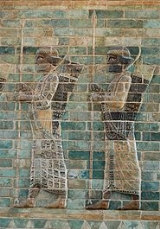
Persian Immortals
Overview
Herodotus
Herodotus was an ancient Greek historian who was born in Halicarnassus, Caria and lived in the 5th century BC . He has been called the "Father of History", and was the first historian known to collect his materials systematically, test their accuracy to a certain extent and arrange them in a...
to an elite force of soldiers who fought for the Achaemenid Empire
Achaemenid Empire
The Achaemenid Empire , sometimes known as First Persian Empire and/or Persian Empire, was founded in the 6th century BCE by Cyrus the Great who overthrew the Median confederation...
. This force performed the dual roles of both Imperial Guard
Imperial Guard (disambiguation)
An imperial guard or palace guard is a special group of troops of an empire, typically closely associated directly with the Emperor or Empress...
and standing army during the Persian Empire's expansion and during the Greco-Persian Wars
Greco-Persian Wars
The Greco-Persian Wars were a series of conflicts between the Achaemenid Empire of Persia and city-states of the Hellenic world that started in 499 BC and lasted until 449 BC. The collision between the fractious political world of the Greeks and the enormous empire of the Persians began when Cyrus...
. Its Persian name may have been Anûšiya ('companions').
Herodotus describes the 'Immortals' as being heavy infantry
Infantry
Infantrymen are soldiers who are specifically trained for the role of fighting on foot to engage the enemy face to face and have historically borne the brunt of the casualties of combat in wars. As the oldest branch of combat arms, they are the backbone of armies...
led by Hydarnes
Hydarnes
Hydarnes was an eminent Persian, the commander of the "Ten Thousand Immortals" during the time of king Xerxes invasion of Greece.Perhaps the most famous episode involving Satrap Hydarnes and his Immortals came at the Thermopylae in 480 BC, when they came into contact with Leonidas of...
that were kept constantly at a strength of exactly 10,000 men.
Unanswered Questions

